Women riding aside leads to dangerous (and ridiculous) saddle invention.

As absurd as this may sound, the sidesaddle took hold in the 14th century to protect the virginity of a teenaged princess traveling across Europe to wed the young King of England.
Surprised? Don’t feel alone. Most assume the sidesaddle was the natural outcome of fashion, demanded by the long, flowing, sometimes over-hooped skirts favored for so many centuries.
But no, protecting the royal hymen was the reason.
For some 500 years, women were told the only way a “proper lady” sat on a horse was sideways, holding on for dear life, a passenger on a 1,500-pound animal she could barely control.
The fate of that princess makes the story even more ludicrous.
Virtuous Virgins
Princess Anne of Bohemia, a predecessor of the modern Czech Republic, was the daughter of the most powerful monarch in Europe in 1382 when she left for England to wed King Richard II. To ensure her virgin marriage, ruling men instructed her to ride aside, rather than astride.
“Good Queen Anne,” as she’d eventually be called, arrived sitting in a large padded chair, holding onto a pommel in front, both feet resting on a wooden plank that hung on the left side of the animal. (Both men and women mount a horse from the left.) Someone led her horse.
She wed a tall, handsome boy she came to love, but who history remembers mainly through William Shakespeare, the playwright who blamed “Richard II” for the Wars of the Roses.
Women hadn’t always ridden so askew.
Although ancient Greek sculptures depict women riding aside, it was an option, not a demand. Joan of Arc didn’t ride into battle in the 1400s as a dainty maid. Geoffrey Chaucer depicted his “Wife of Bath” riding astride in the 1300s. Central Asian women mounted horses like their brothers did, and Amazon women were famous for both their trousers and riding astride.
この記事は True West の November 2017 版に掲載されています。
7 日間の Magzter GOLD 無料トライアルを開始して、何千もの厳選されたプレミアム ストーリー、9,000 以上の雑誌や新聞にアクセスしてください。
すでに購読者です ? サインイン
この記事は True West の November 2017 版に掲載されています。
7 日間の Magzter GOLD 無料トライアルを開始して、何千もの厳選されたプレミアム ストーリー、9,000 以上の雑誌や新聞にアクセスしてください。
すでに購読者です? サインイン
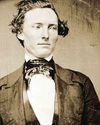
FIREARMS COLT WALKER 47
THE LEGENDARY HANDGUN THAT REALLY WON THE WEST
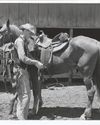
HERITAGE TRAVE
THE AMERICAN WEST IN ALL ITS GLORY OUR ANNUAL FAVORITES LIST CELEBRATES DESTINATIONS ACROSS THE WESTERN UNITED STATES.
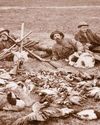
Wild Turkey, and Not the Drinkin' Kind
The actual bird was a favorite of pioneers.
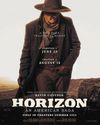
THE PASSION PROJECTS OF THE MODERN WESTERN
A YEAR OF UNDERRATED EXCELLENCE
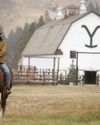
WESTERN BOOKS THEN AND NOW
THE STATE OF WESTERN HISTORY AND FICTION PUBLISHING IN 2024 IS ONE OF GRIT AND DETERMINATION.

SAMUEL WALKER VALIANT WARRIOR
While a prisoner at the castle of Perote, Walker was put to work raising a flagpole. At the bottom of the hole, Walker placed a Yankee dime, vowing to someday come back and retrieve it, at the same time exacting revenge on his Mexican captors. In the summer of 1847, when Walker's mounted riflemen returned and routed Santa Anna's guerillas, the young captain kept his promise and got his dime back.
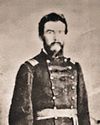
THE BATTLE OF CENTRALIA
ON September 27, 1864, Bloody Bill Anderson and about 80 men took over the small railroad village of Centralia, looting stores and discovering a barrel of whiskey that they hauled out into the street. Wild enough when sober, they soon were roaring drunk.
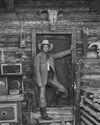
THE MAN WHO SHOOTS THE WEST
Jay Dusard is a living American photographer who has made Arizona his home for over 60 years, seeing it first in 1960 on a visit, moving here for good in 1963.
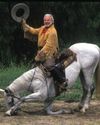
A TRUE WESTERNER INDEED PHIL SPANGENBERGER 1940-2024
Spangenberger had Nevada trained to bow by the legendary horse trainer, Glenn Randall, who trained Roy Rogers' Trigger, Gene Autry's Champion, Rex Allen's Koko and the Ben Hur chariot horses, among other great equines.

Where Did the Loot Go? - This is one of those find the money stories. And it's one that has attracted treasure hunters for more than 150 years.
Whatever happened to the $97,000 from the Reno Gang's last heist? Up to a dozen members of the Reno Gang stopped a Jeffersonville, Madison and Indianapolis train at a watering station in southern Indiana. The outlaws had prior intelligence about its main load: express car safes held about $97,000 in government bonds and notes. In the process of the job, one of the crew was killed and two others hurt. The gang made a clean getaway with the loot.